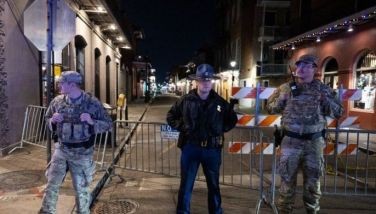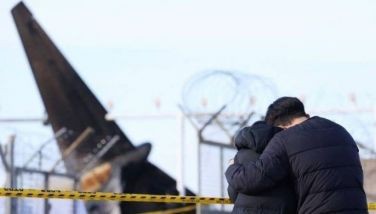Outrage in Mideast over IS killing of Jordan pilot
CAIRO — A video purportedly showing Islamic State militants burning a captive Jordanian pilot to death brought an outpouring of grief and rage across the Middle East on Wednesday, its brutality horrifying a region long accustomed to violence.
Political and religious leaders offered angry denunciations and called for blood, while at least one wept on air while talking about the killing of 26-year-old Lt. Muath Al-Kaseasbeh, whose F-16 crashed in Syria in December during a U.S.-led coalition raid on the extremist group.
The head of Sunni Islam's most respected seat of learning, Egypt's Al-Azhar, described the militants as enemies of God and the Prophet Muhammad, saying they deserved the Quran-prescribed punishment of death, crucifixion or the chopping off of their arms.
"Islam prohibits the taking of an innocent life," Ahmed al-Tayeb, Al-Azhar's grand sheik, said in a statement, adding that by burning the pilot to death, the militants violated Islam's prohibition on the mutilation of bodies, even during wartime.
Capital punishment is used across much of the mostly Muslim Middle East for crimes like murder and drug smuggling. Death by hanging is the preferred method, but beheadings are routinely carried out in Saudi Arabia. In Iran and Pakistan, stoning to death as punishment for adultery exists in the penal code but is rarely used.
Burning to death as legal punishment, however, is unheard of in the contemporary Middle East, and a prominent Saudi cleric, Sheik Salman al-Oudah, wrote Wednesday that it is prohibited by Islam, citing what he said was a saying by the Prophet Muhammad that reserves for God alone the right to punish by fire in the after-life.
Iyad Madani, the leader of the 57-nation, Saudi-based Organization of Islamic Cooperation, the world's largest bloc of Muslim countries, condemned the killing.
It "utterly disregards the rights of prisoners Islam has decreed, as well as the human moral standards for war and treatment of prisoners," a statement from Madani said. It is sad to see "the depth of malaise" in parts of the Middle East, along with the "intellectual decay, the political fragmentation and the abuse of Islam, the great religion of mercy."
Condemnations quickly came from Gulf Arab nations, all of which are close U.S. allies.
The foreign minister of the United Arab Emirates, Sheikh Abdullah bin Zayed Al Nahyan, condemned the killing and reaffirmed his nation's commitment to fighting terrorism and extremism.
"This heinous and obscene act represents a brutal escalation by the terrorist group, whose evil objectives have become apparent," he said.
The UAE is one of the most visible Arab members in the U.S.-led coalition battling the Islamic State group, which also includes Jordan. Its participation received intense publicity when the government there released photographs of a female UAE pilot who was taking part in the airstrikes.
Bahrain, a Gulf state that is home to the U.S. 5th Fleet, denounced the killing as "despicable," and Kuwait's emir, Sheikh Sabah Al Ahmad Al Sabah, blasted the killing as "criminal" and "vicious."
Qatar's Foreign Ministry also condemned it, saying it was "a criminal act contravening the tolerant principles of the Islamic faith, human values and international laws and norms." The tiny but very rich Gulf nation hosts the regional command center coordinating coalition airstrikes.
Iran, which has aided both Iraq and Syria against the IS group, said the killing of the pilot was an "inhuman" act that violated the codes of Islam, according to a statement by Foreign Ministry spokeswoman Marziyeh Afkham.
Religious and political leaders have condemned past atrocities committed by the Islamic State group, including the beheading of foreign journalists and aid workers and the mass killing of captured Iraqi and Syrian soldiers.
But the killing of al-Kaseasbeh, who had been the subject of intense negotiations over a possible swap with an al-Qaida prisoner on death row in Jordan, seems to have hit much closer to home. The prisoner, an Iraqi woman convicted of involvement in a triple hotel bombing in Amman in 2005, was executed along with another al-Qaida prisoner at dawn on Wednesday.
The pan-Arab al-Hayat newspaper led its coverage of the pilot's killing with a one-word headline: "Barbarity."
"How many Syrian al-Kaseasbehs are there?" asked an article in the left-leaning Lebanese daily Assafir. "How many ... are there, whose names we are ignorant of, slaughtered by the Islamic State and their brothers? How many Syrian al-Kaseasbehs have fallen in the past four years ... without news headlines on the television channels?"
Jordanian politician Mohammed al-Rousan wept on television as he described watching al-Kaseasbeh's death, saying even people attuned to violence could not bear to see a man burned alive.
But in an instant his grief turned to rage.
"Let's use the same methods as them!" he shouted during the interview with Lebanon's al-Mayadeen TV. "Let's kill their children! Let's kill their women!"
- Latest
- Trending































